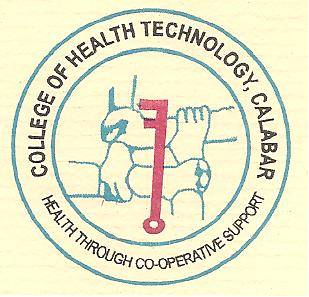History of College of Health Technology Calabar
The College of Health Technology, Calabar, started as Institute of Public Health in the later part of 1970, using the Diamond Health Centre, Diamond Hill, Calabar as its temporary site. During this period, twenty one (21) School Health Attendants and five (5) Community Nursing Students were admitted for training. Early in 1971, the Institute moved to No. 2 Hawkins Road, Calabar , yet another temporary accommodation. Other cadres of Health personnel trained by the School were Rural Health Assistants and Leprosy Attendants. The College moved to its permanent site at Mary Slessor Avenue, Calabar in 1975.

In 1976, the names of the Institution was changed to School of Health Technology following its approval by the Federal Ministry of Health. In the same year, the first batch of Public Health Nurses, direct intake of Community Midwives, Rural Health Superintendents, Public Health Superintendents (now Junior Community Health Extension Workers (JCHEWs)), Medical Records Assistants and Assistant Medical Records Officers were trained.
In 1985, the National Certificate in Health Records and Vital Statistics Program was introduced.
Other programs subsequently introduced were: Direct COmmunity Health Officers, Community Health Supervisors, Health Information Management Technicians, Senior Community Health Extension Workers (SCHEWs), Medical Laboratory Assistants/Technicians, Pharmacy Technicians and Radiography Technicians.
In 1999, the College was granted provisional approval by National Board for Technical Education (NBTE) to run Public Health Nursing (PHN) and Environmental Health (EH) Programs at HND level.
On November 6, 2201, the Cross River State College of Health Technology, Calabar Law was assented to by His Excellency Mr. Donald Duke, the then Governor of Cross River State.
In 2002, the then Principal of the School, Mrs Ako A. B. Adam was appointed Acting Provost of the Institution, following its Collegiate Status as conferred by the Law.
In August 2005, the Second Governing Council was inaugurated with Dr. Mike Nkwam as the Chairman and Dr. Franklin Ani as the substantive Provost.
In 2006, the General Studies Department was created to take care of service courses as required by National Board for Technical Education (NBTE).
By 2007, other Principal Officers of the College, the Registrar, the Librarian and the Bursar assumed duty.
In 2011, NBTE granted full accreditation for HND Public Health Nursing and Provisional accreditation to run the National Diploma in Health Information Management, Environmental Health and Community Health Programs.
In 2013, a Centre for Entrepreneurial Studies (CES) was established as a mandatory accreditation requirement by NBTE. In the same year, NBTE then granted the College full accreditation to run HND in Environmental Health and Health Information Management Programs.
In 2014, the College introduced Dispensing Opticianry Program and re-introduced the Radiography Technicians Program.
The staff strength of the College has also grown for both Academic and Non-Academic staff complementary to the College expansions.
Source: chtcalabar.edu.ng



